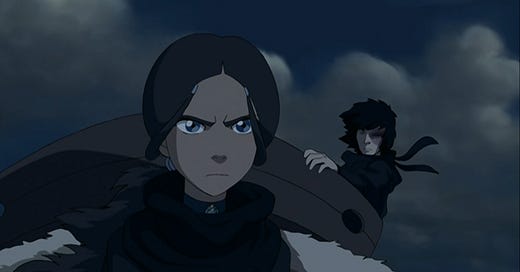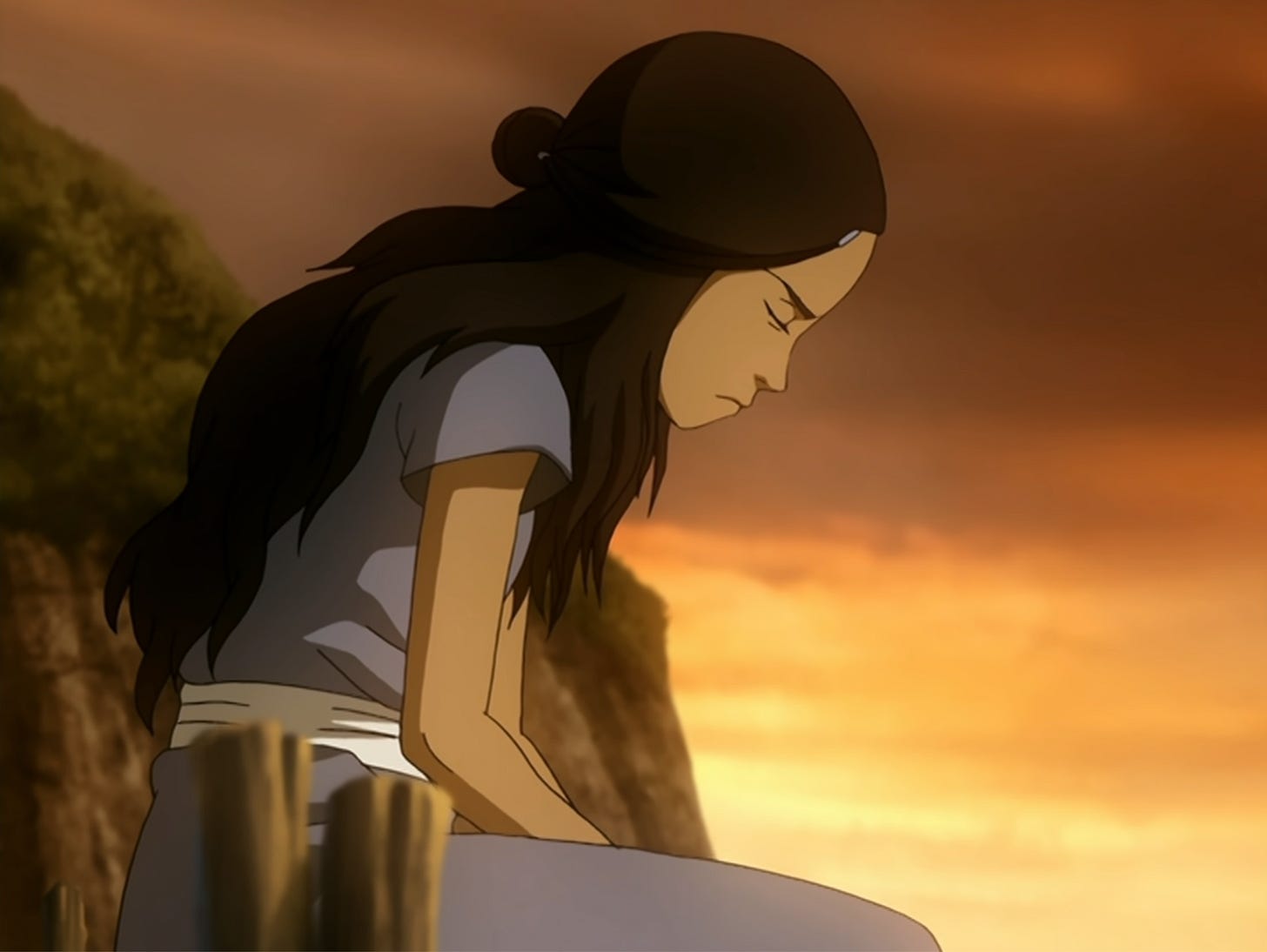Thanks for tuning in to my fifty-sixth of 61 daily reviews of Avatar: The Last Airbender! Yesterday, we watched S3E14 / S3E15: The Boiling Rock.
Some of Avatar’s most powerful stories emerge when it leans into its darkest impulses. In this absolute triumph of an episode, it’s Katara’s turn to take an adventure with Zuko. Her quest? To hunt down the man who murdered her mother.
But first, let’s talk about the beginning of this episode. Just after we saw her humiliated and abandoned by her squad in The Boiling Rock, Azula is back with a vengeance. Backed by an armada of airships, she’s ready to show her brother she’s still in control and punish him for stealing Mai’s loyalty.
Zuko’s just as eager to square up with his sister and demonstrate the new power he received in The Firebending Masters. His jaw-dropping leap off a falling column, only to fall short of her airship and plummet into the clouds, proves that though he may be “good” now, he’s still not immune to the same kind of brash pride that got him captured in The Crossroads of Destiny. But miraculously, he lands atop another airship, and Azula almost looks glad she hasn’t lost the chance to kill him herself.
But for the first time ever, Zuko holds his own against Azula in an intense duel, managing to block her fire blasts and advance on her until their simultaneous attacks cause an explosion that sends them both hurtling over the edge. Is he stronger now, or has his sister lost a step? Appa is there to save Zuko, but he’s shocked to see Azula in freefall. Even after all the pain she’s caused him, can he wish death upon his sister? Azula uses her flame propulsion to pull off an unlikely recovery, but that question hovers thematically over the rest of the episode.
Now, the main event, with a brief pause for a hilarious gag where Zuko interrupts some, ahem… evening plans between Sokka and Suki.
To mend Katara’s resentment over his betrayal in The Crossroads of Destiny, Zuko identifies the naval unit who raided the Sokka and Katara and killed their mother. Immediately, it’s like a switch is flipped for Katara, who has a steely, singleminded focus on finding the man responsible.
Now that I know he's out there… now that I know we can find him, I feel like I have no choice.
Aang, the wise pacifist, tries to convince her to forgive him, rightly identifying that she’s less interested in closure than revenge. But she replies “Maybe that's what I need! Maybe that's what he deserves!” Even Sokka agrees with Aang, but she spitefully tells her brother:
Then you didn't love [Mom] the way I did!
It’s an especially cruel jab after her brother’s revelation in The Runaway that he’s not sure he remembers his mother’s face.
We’ve never seen Katara this coldly wrathful or this assertive, even when she battled Master Pakku’s sexism in The Waterbending Master. Mae Whitman gives one of her best performances, brilliantly capturing Katara’s tumultuous mental state to evolve our understanding of her character. And she’s primed to lash out. In their assault on the Southern Raiders’ ship, she brutally blasts the crew overboard and even bloodbends their captain, who turns out to only be the successor of the man she’s hunting — Yon Rha.
As Katara displays her bloodbending, we linger for a moment on a shocked Zuko. Her actions reveal what’s at stake for Katara in this episode: her innocence, and perhaps her very soul. In The Puppetmaster, she sobbed after using the sinister technique against Hama to save Aang. For her to wield it so cruelly here is an indication of how much her pain and rancor has warped her own sense of conscience.
In the chilling final act, Katara and Zuko find Yon Rha in his small village. In retirement, he ekes out a paranoid and miserable existence, ordered around by his brutish, demanding, unappreciative mother whom he cares for. He bears little resemblance to the fearsome “monster” that Katara has built up in her mind. The duo stalks him to a secluded area and then they pounce.
In Yon Rha’s flashback, we finally learn the full tale of Kya’s demise. Katara’s mother sacrificed herself to protect her daughter. She lied that she herself was the last waterbender of the Southern tribe. Katara is so wound up and cathartically, frighteningly flings years of festered wrath at Yon Rha, manifesting her rage with hundreds of jagged icicles that rush to impale their mark.
But she can’t kill him, the man who murdered her mother. As he grovels for his life, she spits:
I always wondered what kind of person could do such a thing, but now that I see you, I think I understand. There's just nothing inside you, nothing at all. You're pathetic and sad and empty.
The subtitle of this review is taken from Hannah Arendt’s controversial 1963 book Eichmann in Jerusalem, which follows the trial of Nazi official Adolf Eichmann. In that book, Arendt coined the phrase “the banality of evil” to describe her observations about Eichmann: that rather than a cunning and conniving tyrant, he was just a dull, incompetent, and power-hungry bureaucrat.
Thanks to depictions in literature and media, we expect to see sadistic, spirited, mustache-twirling villains. Those larger-than-life Hitlers and Ozais. But we’re less prepared to realize that the tapestry of evil is as much weaved by the Yon Rhas and Eichmanns of the world — those “pathetic and sad and empty” people who just want to get ahead; who follow orders without question; who muffle their conscience with equivocations. And in many cases they are those same people who honor their parents and love their children and seek small pleasures where they can find them.
Does Yon Rha deserve to die for his crimes? Even though he’s spared, I don’t think Avatar intends to answer that question conclusively. While the series does frequently warn against perpetuating a cycle of violence, it doesn’t necessarily agree with Aang’s claim that violence is never justified, nor is it sanitized for Nickelodeon’s sake. Instead, the mercy that Team Avatar often demonstrates speaks more to these characters we’ve grown to love and their overriding morals. Despite their brutal experiences, they are still just kids — and this show strives as much as possible to let them be that.
Katara spares Yon Rha not because he deserves it, but because killing him would achieve nothing but her own moral debasement. It would not avert anyone’s death, or bring her mother back. She would just be executing a broken old man. The writers are careful to draw a line between inaction, forgiveness, and mercy. Throughout the entire episode, Katara is in full control (of her actions, if not her emotions). She has not done nothing, nor has she pardoned the sniveling husk of the man who destroyed her life. She’s chosen to affirm her humanity and acknowledged the reality of what is done.
I didn't forgive him. I'll never forgive him.
The Southern Raiders is perhaps Avatar’s most compelling and complex forays into one of the series’ key thematic questions: When is violence justified? And the episode closes, Zuko leaves Aang, and us, with the version of that question that will define the rest of the series. It’s a moral dilemma that demands an answer as Aang’s ultimate mission intersects with his pacifism, and one that he should have considered before The Day of Black Sun.
What are you gonna do when you face my father?
See you tomorrow for Episode 17: The Ember Island Players! Share your own thoughts on this episode in the comments.
Spare observations
Can we talk about these airships for a second? These things are insanely fast and powerful and can launch bombs at any angle. Not to mention, they’re massive. It’s frankly unbelievable that the Fire Nation could have developed and produced these in the span of months.
Aang slamming the metal panels shut is a really cool detail and a look into the defense mechanisms of the Air Nomad society.
“You mean it’s not obvious yet? I am about to celebrate becoming an only child!”
It’s the second time Appa’s fear of tunnels separates Team Avatar, after The Cave of Two Lovers.
“So, can I borrow Momo for a week?”
“Get your grimy heinie to the market and buy me some real food!”
The raw emotion behind Katara’s words is unreal. “She lied to you. She was protecting the last waterbender.” “What…? Who?” “ME!”
This is the Zutara episode. Zuko brings out a side of the waterbending girl that we haven’t seen before, and it’s possible to (mis)interpret the emotional heft in her performance as chemistry between them. Also, that look she gives him after they hug at the end of the episode…
Friends of the White Lotus [SPOILERS]
Katara never bloodbends again after this episode.
The battle between Zuko and Azula foreshadows their final Agni Kai in Sozin’s Comet. Katara is with him then, too, and the goodwill they forge together in this episode is intensely relevant there.
At the end of the episode, Team Avatar has relocated to Ozai’s own house on Ember Island, which will serve as their base of operations until the finale.











this one made me tearbend 🥲